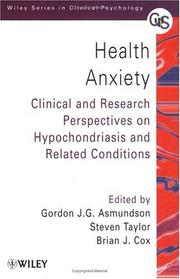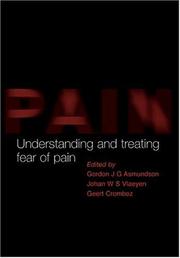| Listing 1 - 8 of 8 |
Sort by
|

ISBN: 0471491047 047199992X Year: 2001 Publisher: Chichester : Wiley,
Abstract | Keywords | Export | Availability | Bookmark
 Loading...
Loading...Choose an application
- Reference Manager
- EndNote
- RefWorks (Direct export to RefWorks)
Hypochondria. --- Medische psychologie --- Gezondheidspsychologie.
Book
ISBN: 0128034580 0128034572 9780128034583 9780128034576 Year: 2017 Publisher: London San Diego, CA
Abstract | Keywords | Export | Availability | Bookmark
 Loading...
Loading...Choose an application
- Reference Manager
- EndNote
- RefWorks (Direct export to RefWorks)
Cognitive therapy. --- Cognitive-behavior therapy --- Cognitive-behavioral therapy --- Cognitive psychotherapy --- Psychotherapy
Book
ISBN: 0128160667 0128160659 9780128160664 9780128160657 Year: 2020 Publisher: London, England : Academic Press,
Abstract | Keywords | Export | Availability | Bookmark
 Loading...
Loading...Choose an application
- Reference Manager
- EndNote
- RefWorks (Direct export to RefWorks)
Adverse Childhood Experiences: Using Evidence to Advance Research, Practice, Policy, and Prevention defines ACEs, provides a summary of the past 20 years of ACEs research, as well as provides guidance for the future directions for the field. It includes a review of the original ACEs Study, definitions of ACEs, and how ACEs are typically assessed. Other content includes a review of how ACEs are related to mental and physical health outcome, the neurodevelopmental mechanisms linking ACEs to psychopathology, sexual violence and sexual health outcomes, and violence across the lifespan. Important and contemporary issues in the field, like reconsidering how ACEs should be defined and assessed, the appropriateness of routine ACEs screening, thinking about ACEs from a public health and global perspective, strategies for preventing ACEs, understanding ACEs and trauma-informed care and resilience, and the importance of safe stable and nurturing environments for children are discussed. Adverse Childhood Experiences is a useful evidence-based resource for professionals working with children and families, including physicians, nurses, social workers, psychologists, lawyers, judges, as well as public health leaders, policy makers, and government delegates. Reviews the past 20 years of ACEs research Examines ACEs and mental and physical health Discusses the neurodevelopment mechanisms of ACEs and psychopathology Examines ACEs and violence across the lifespan Reconsiders the definition and assessment of ACEs Examines the issue of routine ACEs screening Discusses ACEs from a public health and global perspective Summarizes effective ACEs prevention, trauma-informed care, and resilience Provides recommendations for the future directions of the ACEs field
Psychic trauma in children. --- Child psychology. --- Psychology, Child --- Child --- Infant --- Stress Disorders, Traumatic --- Adaptation, Psychological --- therapy --- Adaptation, Psychologic --- Coping Skills --- Psychological Adaptation --- Behavior, Adaptive --- Coping Behavior --- Adaptive Behavior --- Adaptive Behaviors --- Behavior, Coping --- Behaviors, Adaptive --- Behaviors, Coping --- Coping Behaviors --- Coping Skill --- Psychologic Adaptation --- Skill, Coping --- Skills, Coping --- Allostasis --- Resilience, Psychological --- Infants --- Children --- Minors --- Psychology, Infant --- Psychology, Pediatric --- Child Psychology --- Infant Psychology --- Pediatric Psychology --- Psychology, Developmental --- Behavior, Child --- Child behavior --- Child study --- Pediatric psychology --- Child development --- Developmental psychology --- Child psychopathology --- psychology --- Psychology --- Adjustment --- Trauma and Stressor Related Disorders --- Adverse Childhood Experiences. --- Early Life Stress --- Early-Life Stress --- Adverse Childhood Experience --- Childhood Experience, Adverse --- Childhood Experiences, Adverse --- Early Life Stresses --- Early-Life Stresses --- Life Stress, Early --- Life Stresses, Early --- Stress, Early Life --- Stress, Early-Life --- Stresses, Early Life --- Stresses, Early-Life
Digital
ISBN: 9780128034583 0128034580 Year: 2017 Publisher: London ;San Diego, CA Academic Press
Abstract | Keywords | Export | Availability | Bookmark
 Loading...
Loading...Choose an application
- Reference Manager
- EndNote
- RefWorks (Direct export to RefWorks)
And Future Directions -- References -- Further Reading -- 11 Cognitive-Behavioral Therapy for Children and Adolescents -- The CBT Model of Psychological Treatment -- Eight Key Components of CBT Practice across the Lifespan -- Distinguishing Attributes and Key Considerations for CBT when Working with Child Populations -- Developmental Compatibility -- Mental Representation -- Causal Reasoning -- Counterfactual Reflection -- Consideration of Future States and Hypotheticals -- Theory of Mind -- Emotion Understanding and Regulation -- Therapeutic Alliance and the Posture of the Therapist -- Therapy Participants and Settings -- Parental Involvement -- School Personnel Involvement -- Child and Adolescent CBT Components for Specific Problem Areas -- CBT for Child Anxiety -- CBT for Child Depression -- CBT for Child Trauma -- CBT for Disruptive Behavior Problems and Attention-Deficit/Hyperactivity Disorder -- Recent Advances and Innovations -- Transdiagnostic CBT -- Modular CBT -- Intensive CBT -- Technology and CBT -- Future Directions and Concluding Thoughts -- References -- III. Problem-Focused Approaches -- 12 Behavioral Activation Treatments for Depression -- Historical and Theoretical Foundations -- Contemporary Behavioral Activation Approaches -- Behavioral Activation (BA) -- Activity Monitoring -- Functional Analysis of Behavior -- Activity Scheduling -- Other Therapeutic Techniques -- Structure of Therapy -- Behavioral Activation Treatment for Depression (BATD) -- Activity Monitoring -- Life Areas, Values, and Activities -- Activity Selection and Ranking -- Contracts -- Structure of Therapy -- Core Principles and Techniques -- Principles -- Focus on Behavior -- Functional Analysis -- Basic Behavioral Change Mechanisms -- Techniques -- Activity Monitoring -- Assessment of Goals and Values -- Activity Scheduling -- Contingency Management.
Digital
ISBN: 9780128160664 0128160667 Year: 2020 Publisher: San Diego, UNITED STATES Academic Press
Abstract | Keywords | Export | Availability | Bookmark
 Loading...
Loading...Choose an application
- Reference Manager
- EndNote
- RefWorks (Direct export to RefWorks)
Adverse Childhood Experiences: Using Evidence to Advance Research, Practice, Policy, and Prevention defines ACEs, provides a summary of the past 20 years of ACEs research, as well as provides guidance for the future directions for the field. It includes a review of the original ACEs Study, definitions of ACEs, and how ACEs are typically assessed. Other content includes a review of how ACEs are related to mental and physical health outcome, the neurodevelopmental mechanisms linking ACEs to psychopathology, sexual violence and sexual health outcomes, and violence across the lifespan. Important and contemporary issues in the field, like reconsidering how ACEs should be defined and assessed, the appropriateness of routine ACEs screening, thinking about ACEs from a public health and global perspective, strategies for preventing ACEs, understanding ACEs and trauma-informed care and resilience, and the importance of safe stable and nurturing environments for children are discussed. Adverse Childhood Experiences is a useful evidence-based resource for professionals working with children and families, including physicians, nurses, social workers, psychologists, lawyers, judges, as well as public health leaders, policy makers, and government delegates

ISBN: 0191644986 1417599936 9781417599936 9780191644986 0198525141 1383024170 Year: 2023 Publisher: Oxford : Oxford University Press,
Abstract | Keywords | Export | Availability | Bookmark
 Loading...
Loading...Choose an application
- Reference Manager
- EndNote
- RefWorks (Direct export to RefWorks)
People who suffer from chronic pain are typically found to be more anxious and fearful of pain than those who do not. Studies have shown how pain itself can serve as a mechanism through which chronic pain is maintained over time, through a chain of behavioural processes.
Pain --- Chronic pain --- Anxiety. --- Anxiety --- Angst --- Anxieties --- Anxiousness --- Emotions --- Stress (Psychology) --- Agitation (Psychology) --- Fear --- Worry --- Pain management --- Pain medicine --- Treatment. --- Psychological aspects.
Book
ISBN: 9781412983631 Year: 2002 Publisher: Thousand Oaks, Calif. ; London : SAGE,
Abstract | Keywords | Export | Availability | Bookmark
 Loading...
Loading...Choose an application
- Reference Manager
- EndNote
- RefWorks (Direct export to RefWorks)
This text addresses practical aspects of research sure to be encountered during training. It emphasises that research methods are appropriate to most clinical settings while dealing with many issues of clinical research that are often ignored.
Psychiatry --- Research --- Methodology.

ISBN: 9780198525141 0198525141 Year: 2004 Publisher: Oxford [etc.] Oxford University Press
Abstract | Keywords | Export | Availability | Bookmark
 Loading...
Loading...Choose an application
- Reference Manager
- EndNote
- RefWorks (Direct export to RefWorks)
Pain --- Chronic Disease - psychology --- Phobic Disorders - prevention and control --- Pain - Treatment --- Chronic pain - Treatment --- Anxiety --- Anxiety - Treatment --- Anxiety. --- Chronic pain --- Medische psychologie --- Treatment. --- gezondheidspsychologie. --- Chronic Disease --- Phobic Disorders
| Listing 1 - 8 of 8 |
Sort by
|

 Search
Search Feedback
Feedback About UniCat
About UniCat  Help
Help News
News